ReNamer:Files menu
When you click on the ![]() button, the following list pops up:
button, the following list pops up:
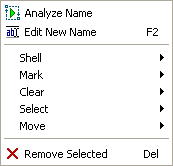
| Analyze Name | Opens analysis window, and loads the names of the selected files into it. |
| Edit New Name F2 | Starts manual editing of the selected filename. |
| Shell | Options for Windows shell operations. |
| Mark | Options for marking specific items. |
| Clear | Options for removing specific items from the Files pane. |
| Select | Options for selecting specific items. |
| Move | Options for moving specific items. |
| Remove selected items Del | Remove selected items from the ReNamer's File pane. (This command does not delete the items from the disk.) |
This menu provides second-level options, as follows:
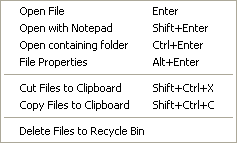
| Open File | Enter | Open the selected file using its default associated application. |
| Open with Notepad | Shift+Enter | Open the file with notepad. Useful when you want to see the raw data in the file. (When viewed this way, the file will not be displayed in its original formatting. It may not be easily readable.) |
| Open operating folder | Ctrl+Enter | Launch Windows Explorer and open the folder where the selected file is located. Highlight (select) the file in it. |
| File properties | Alt+Enter | Display the properties of the selected file. Typically, file size, dates (created/modified/accessed), comments, author, attributes (hidden, system, etc.) |
| Cut Files to clipboard | Shift+Ctrl+X | Cuts the selected file(s) to clipboard. Note: If you paste these files in Windows Explorer, all files will be moved to one folder, no matter where they were initially located. |
| Copy Files to clipboard | Shift+Ctrl+C | Copies selected file(s) to clipboard. Note: If you paste these files in Windows Explorer, all files will be copied to one folder, no matter where they were initially located. |
| Delete files to Recycle Bin | Deletes the selected file(s) to Recycle Bin. (They can be recovered from the Recycle Bin.)
Note that if the file is too large for the Recycle Bin, Windows will warn you that it will not be put in Recycle Bin, but deleted permanently. If you confirm, the file is deleted permanently. |
There are 2 possible uses for Copy to clipboard and Cut to clipboard options:
- 3rd party application can retrieve that list of files from the clipboard (using Paste operation or Win API).
- Paste all files into a singe destination folder via Windows Explorer, even when files are scattered across different directories.
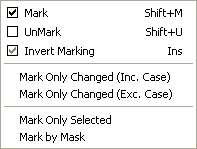
Note: Marking of files is explained here.
| Mark Shift+M | Mark all selected files. If some files are already marked, they remain marked. |
| UnMark Shift+U | Unmark all selected files. If some files are already unmarked, they remain unmarked. |
| Invert Marking Ins | Marked files become unmarked, and vice versa. |
| Mark only changed (Inc. Case) |
Mark files that have been changed. Files that had just change of case (and nothing else) will also be marked. ("Change of case" means some letters are converted capital-to-small and/or small-to-capital) |
| Mark only changed (Exc. Case) |
Mark files that have been changed, but do not consider changes of case. ("Change of case" means some letters are converted capital-to-small and/or small-to-capital) |
| Mark only selected | Mark files that are selected. If some unselected files are already marked, they will be unmarked. |
| Mark by Mask | Pops up a Mask window:
Specify a mask pattern. All files that match this mask will be marked. You can enter multiple masks (separating them with semicolon). If a file matches any of these masks, it will be marked. |
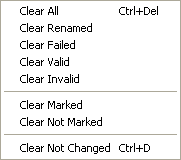
Note: The term "Clear" means remove from Files pane of ReNamer.
| Clear All | Clear all files loaded in the pane. |
| Clear Renamed | Clear all files which have been renamed just before this command. Note that even if some files are not affected by the rules, they are still regarded as renamed successfully.
Only files that failed to rename (those with an x mark) will remain in the pane. |
| Clear Failed | Only files that failed to rename (those with an x mark) will be cleared.
All other files (including files whose names were not altered by the rules) will remain in the Files pane. |
| Clear Valid | Clear files that have valid names after Preview (but haven't been renamed yet). |
| Clear Invalid | Clear files that got invalid (causing conflicts, empty or with forbidden characters etc.) names after Preview (but before renaming). |
| Clear Marked | Clear all marked files. |
| Clear Not Marked | Clear all files that are not marked. |
| Clear Not Changed Ctrl+D | Clear all files that haven't been changed by the Preview. This also includes all files that have their New Name field empty (eg. because they have been successfully renamed or haven't been previewed since last renaming operation). |
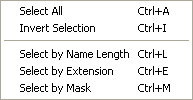
Note: Selection of files is explained here.
| Select All Ctrl+A | All files in the pane will be selected. |
| Invert Selection Ctrl+I | Selected files become deselected, and vice versa. |
| Select by Name Length Ctrl+L | Pops up a window:
Specify the length of file name. Only files that exceed that length will be selected. The length refers to the whole filename including dot and the extension. Note: A typical application is to check if the file can be put on a CD/DVD. The maximum length allowed in ISO 9660-compliant file-system is 64 characters. Longer file names are truncated when you burn a CD/DVD. It is difficult to correlate such files with their originals. To avoid such problems, shorten the names before burning the CD/DVD. |
| Select by Extension Ctrl+E | Pops up a window:
Specify the extension (without the dot). All files having that extension will be selected. You can enter multiple extensions (they must be separated by semicolons - not comma). |
| Select by Mask Ctrl+M | Pops up this window:
Specify the mask. All files matching that pattern will be selected. |
| Up Ctrl+Up | Moves the selected file up. This is used to re-arrange files in the list.
It is easier to use the keyboard shortcut CTRL+UpArrow. |
| Down Ctrl+Down | Moves the selected file down. This is used to re-arrange the files list.
It is easier to use the keyboard shortcut CTRL+DownArrow. |



